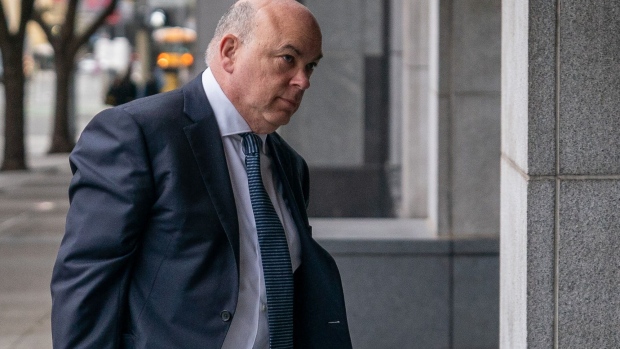May 29, 2024
UK’s Mike Lynch Downplays ‘Disaster’ Email at His Fraud Trial
, Bloomberg News

(Bloomberg) -- UK tech tycoon Mike Lynch downplayed the concerns of the finance chief at his software startup as he sought to defend himself against criminal charges that he duped Hewlett Packard Co. into buying the company for $11 billion 13 years ago.
On Wednesday in San Francisco federal court, Lynch was shown messages from prior to the sale between him and Sushovan Hussain, the former chief financial officer at Autonomy Corp. who was convicted of fraud in 2018 and sentenced to five years in prison. Hussain raised various issues about the business with Lynch in the emails from 2009 to 2011, including that Europe was a “disaster” during the first quarter of 2009.
Lynch dismissed the comments as typical hand-wringing from the finance chief.
“As you’ll see from Mr. Hussain, he tends to live quarters much like a coach of the football team so you tend to get quite lively language from him,” Lynch testified.
Lynch lost a London civil trial in 2022 over the ill-fated acquisition of Autonomy and HP is seeking $4 billion in damages, though the UK judge has said he’ll likely award “substantially less.” Now, Lynch is fighting a criminal case in the US that carries a maximum sentence of 25 years in prison for the most serious charge.
The jury spent the first nine weeks of the trial watching the government present evidence through dozens of witnesses and various documents, emails and recordings. Starting last week, Lynch took the stand in his own defense — rare in white-collar fraud trials. He has claimed ignorance of some of the wrongdoing attributed to him and denied other allegations.
Read More: Mike Lynch Rejects Blame for Merger Gone Bad at US Trial
Lynch has testified that Autonomy was “highly profitable” ahead of the HP deal. He said Wednesday that the third quarter of 2009, around when Hussain again voiced concerns about Europe, turned out to be a “record quarter.”
During cross examination, Lynch was confronted with an email from Hussain in December 2010 telling him, “as I guessed, revenue fell away completely.” Lynch responded that, rather than expressing concern about the business, Hussain was complaining that he couldn’t trust his sales managers’ predictions.
Prosecutors also displayed emails from over a decade ago alerting Lynch that deals with Eli Lilly & Co. and the US Department of the Interior weren’t moving forward.
Lynch testified that sometimes deals ultimately close even after companies initially say no.
The trial is now in its final stretch, with closing arguments and jury deliberations expected next week.
The case is US v. Lynch, 18-cr-00577, US District Court, Northern District of California (San Francisco).
(Updates with Lynch testimony)
©2024 Bloomberg L.P.





